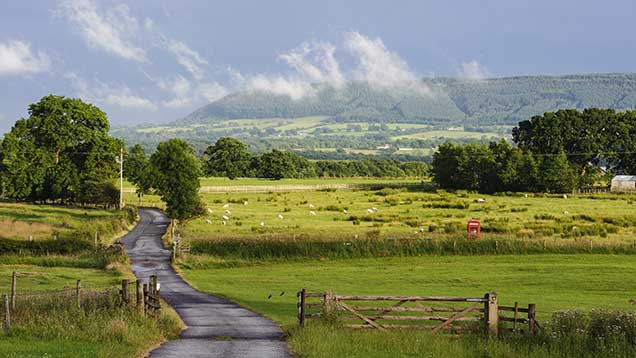Tenancy market needs more freedom, not less – CLA
 © Rex
© Rex The Tenant Farmers’ Association is campaigning for a minimum 10-year term for Farm Business Tenancies, along with tax changes to encourage this. CLA chief surveyor Andrew Shirley sets out the landowners’ case for more choice and fewer restrictions.
There are big challenges facing the future of farming. We are experiencing increasingly unpredictable weather conditions and volatile markets for products. The techniques and equipment required to achieve profitable levels of production require capital, experience and skills that are making it ever harder for new entrants to establish a farming business.
See also: Give tax relief only on longer farm business tenancies-tfa
It is this context that we must view the debate on the future of agricultural tenancies. The CLA believes that tenancies are one of the ways for farmers to maintain an effective business. We are not convinced that an intervention to change the law with the sole purpose of increasing the average length of all tenancies will address these challenges.
We take a positive view of the role of Farm Business Tenancies. We must not forget what they replaced. Agriculture Holding Act tenancies, designed for the needs of post-war farming, were highly protected and regulated in every aspect (even down to replacing slipped roof tiles). By the 1980s the protections these gave to existing tenants, benefiting from artificially low rents and two rights of succession, meant that pitifully little land was coming on to the market. The whole tenancy market had ground to a standstill.
From 1995 Farm Business Tenancies (FBTs) increased the amount of land available by allowing freedom of contract, providing flexibility for both landlords and tenants. The result has been a much more competitive and diverse market for land and thousands of businesses have taken advantage of this opportunity to grow and innovate.
As we look to the future we believe the industry needs more freedom, not less. For example, we should be finding ways to encourage AHA tenants towards FBT arrangements. We know that some forward-thinking tenants have already accepted FBTs and have seen the benefits, taking on increased land holdings and attracting increased investment in the land or equipment by the landowner.
To characterise FBTs as being all short term is wrong. The majority of complete farms (land buildings and a house) are let for an average term of just less than 10 years. It is the large number of bare land lets that drag the overall average down, but they have always been short term, often small area agreements that were previously grazing or cropping licences, and will always remain so. Freedom is increasing landowner confidence and there is a trend to long-term letting. Calls for increased regulation will kill this trend dead just as it did in the 1970s.
Ad hoc changes to legislation and taxation to try and force more businesses into long-term tenancy agreements is not the way to achieve progress and often has the opposite of the desired effect.
Our major objections to the Tenant Farmers Association’s campaign are firstly the characterisation of non-tenant farming models as a tax avoidance scam and not a legitimate option for farming businesses. Share and contract farming are important options that farmers can adopt to grow a strong business, support their families and generate employment. These are every bit as valuable as tenanted units.
Secondly, it is very hard to see how forcing landowners to make land available on long-term lets would benefit anyone other than existing tenant businesses. The barriers to entry in terms of land cost, equipment and skills are not resolved by asking new entrants to make long-term commitments from the outset. Instead, the effect of forcing longer tenancies would be to provide more opportunities for the existing tenant businesses that already have all the advantages. That is why we need a range of options to encourage new farmers into the industry.
If taxation is to be reviewed it should be done in a way that encourages flexibility for all farming and land owning businesses. It is the current distinction between trading and property businesses that determine the way in which income is taxed and the availability of tax reliefs such as IHT business property relief and CGT roll-over relief. The Office of Tax Simplification has recommended the removal of this distinction so that all rural land can be taxed as one portfolio, whether farmed in-hand or let to tenants. We hope the Treasury will accept this recommendation, because it would really benefit the UK, allowing the best business decisions to be taken for the most efficient management of the land.
We do not think that the current system is perfect and we are open to discussion of reform. However reform has to be based on a balanced view and needs to extend beyond a debate about the length of tenancies. We believe that the Tenancy Reform Industry Group offers the best potential for change – give it time and through consensus it will deliver results.
*The TFA is campaigning throughout 2015 for a 10-year minimum term for FBTs. Farmers Weekly is airing the debate. Read George Dunn’s article on the subject
